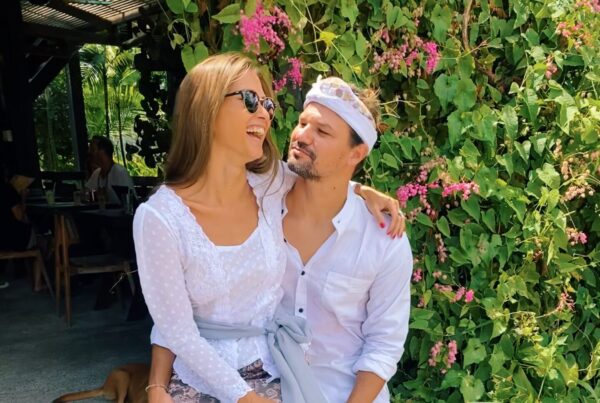When our clients Lisa and Ken packed up their life in Schoten, Belgium, along with their teenage sons Rey (16) and Marcèl (13), they weren’t just planning another tropical vacation. They were embarking on a 10-month adventure that would transform their daily routines, challenge their expectations, and offer a complete reset from their 9-to-5 European lifestyle. After years of dreaming about living abroad but never taking the leap, this family of four finally made the bold decision to swap the familiar comforts of northern Belgium for the vibrant, chaotic, and beautiful island of Bali. Now several months into their experience, Lisa opens up about everything from navigating monsoon season on a motorbike to finding an international school that their boys actually enjoy attending – offering an unfiltered look at expat life.
Can you tell us a little bit about yourself? Where are you originally from?
I’m Lisa, 46 years old, and I live together with my husband Ken and our two sons: Rey (16) and Marcèl (13). We’re originally from Schoten, a town in northern Belgium, near the city of Antwerp. Traveling is my biggest passion. I like running and hiking and I also love good food!

When did you first arrive in Bali, and how long do you wish to live here?
What motivated you to move to Bali, and how did you go about making the decision to do so?
How did you hear about Our Year in Bali, and what was your experience with Simone’s support?
Where in Bali do you live? Describe the neighbourhood, community, things to do etc.

Adapting to Island Life: How Has Your Family’s Transition Unfolded, and What Unexpected Benefits Has Bali Brought to Your Daily Routine?
It all happens in phases. In the beginning, it was quite overwhelming. There were still many practical things to sort out, and we didn’t know our way around yet. Most of our time was spent figuring things out. For our boys, it was different—they had to start school right away, so they settled into a routine much faster.
Other perks? Laundry services are incredibly cheap—it’s picked up at your door, and it comes back freshly washed and ironed. Ordering food is so easy, the variety is huge and it’s actually cheaper than buying groceries in the supermarket, so I barely cook. There’s simply more time to relax.

What school are your children going to? How has school life been in Bali so far? Please share!
Our children attend Summit Academy in Kerobokan, an international boutique education academy that follows the Cambridge curriculum. It’s by far the best decision we’ve made. The kids felt welcomed and at ease right away, making friends within the first week.

How has the cost of living compared to back home? What are you able to afford that you wouldn’t normally, for example?

How has living in Bali influenced your personal and professional life, and what opportunities have you found here?

What are some of the biggest challenges you’ve faced?

What are your favourite things to do in Bali? Any new hobbies and interests?

What is a day in a life?

What do you think are the biggest misconceptions about Bali, and how would you correct them?
What has been some of your favourite discoveries so far in Bali and perhaps beyond?

What are some factors that families looking to live in Bali should consider?









